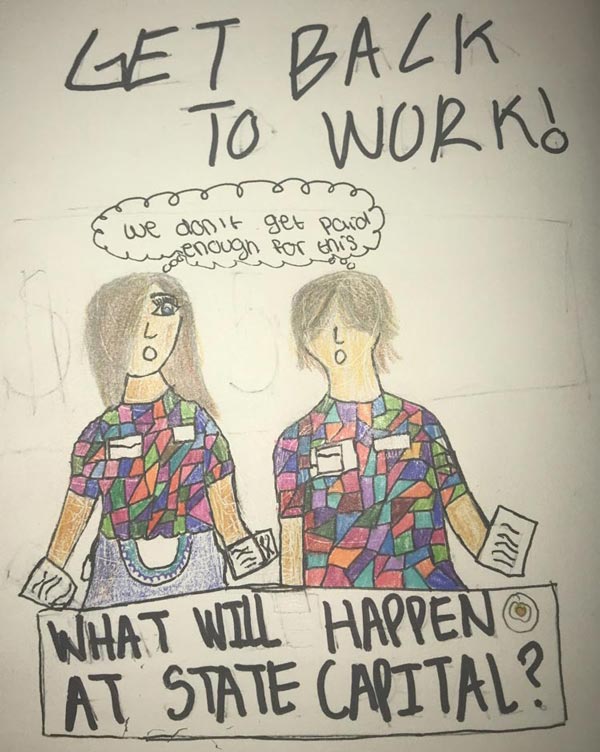New legislation to raise the minimum wage and grant paid sick leave
By Josiah Thomas, Campus Life Editor
Illustration by S
Addendum: The Michigan Supreme Court did not issue an opinion on the minimum wage and sick leave laws, but they are still in effect. Whether these laws are constitutional is an open question until the court hears oral arguments on July 17.
The average college student, at one point or another, has had to rely on a minimum wage job to get by. Last September, they must have been relieved to see the Michigan State Legislature adopt a citizen-led ballot initiative which raised the state’s minimum wage and required employers to offer paid sick leave for physical injury and health conditions, as well as mental or physical illness that affect themselves or a loved one.
The current minimum wage is $9.45, and according to the Secretary of State’s website, “The ballot initiative was designed to increase the state’s minimum wage between 60 and 75 cents each year until reaching $12.00 in 2022; thereafter, the initiative was designed to tack the minimum wage to inflation.”
The initiative also looks to phase out the lower $3.52 minimum wage for restaurant servers and other tipped employees, bringing it up to $12 by 2024.
What does all of that mean for us students trying to get by?
As someone who had to rely on this kind of work for over a year, I can appreciate what the people in our state tried to do.
Putting myself in the shoes of a kid in a McJob, getting started in the working world would be made easier. Even though rent can’t be paid on minimum wage, one can have a paycheck that easily keeps up with the U.S. dollar’s increasing inflation. Being able to take some time off to get better would be grand without the threat of getting fired or losing a paycheck because, let’s face it, I don’t think anyone would want to lose a job or a paycheck to care for themselves or a loved one during an emergency situation.
Though I do question how this all would be covered at taxpayers’ expense. This is a good safety net for people who have to rely on it, if nothing else.
We would have had it, if then-governor Rick Snyder not stepped in with the GOP’s backing. Despite the initiative passing through both State House of Representative and the Senate last December, amendments were passed to weaken the provisions of the initiative. Instead of the minimum wage increasing to $12 by 2022, the Republicans’ amendments made it so that wages would slowly rise to $12.05 by 2030, delaying raises by eight years and barely keeping up with inflation. Further amendments did require employers to offer up to 40 hours of sick leave, but also set exemptions for “businesses with fewer than 50 employees from the sick leave law” according to Bridge Magazine.
Beginning this year with the new plan, the state’s minimum wage will do more than keep up with these trends, assuming that these rates will hold. The current $9.25 an hour minimum wage is set to go up to $10 in 2019, $10.65 in 2020, $11.35 in 2021, and finally $12 in 2022. To reiterate, future increases after 2022 are going to be tied to inflation under the plan.
The provision, which sought to eliminate the lower $3.52 minimum wage for tipped workers has sparked intense opposition from Michigan Restaurant Association. Its CEO and president Justin Winslow have called it “reckless to force Michigan into the distinct minority of states that have eliminated the tipped minimum wage.”
Wages need to keep up with inflation as it increases over time.
I understand that minimum wage is not intended to be a living wage, but instead something that helps young people get their foot in the door of the working world and help the less fortunate have some dependable income.
Interest rates are lower now than they have been in years past, falling more and more in the next four years, but the dollar is still going to be worth less in the future than it is now.
The Small Business for a Better Michigan Coalition, which includes the Michigan Chamber of Commerce and Michigan Farm Bureau, submitted a motion to the state’s Supreme Court in order to get an advisory opinion so that the constitutionality of the minimum wage and sick leave law will be weighed in on. State Rep. Tristan Cole R-Mancelona commented on this motion, saying that it’s being done “For political expediency, and to resolve this as soon as possible.”
Danielle Atkinson, co-chairwoman of the “MI Time to Care” ballot committee and the one who wrote the sick leave law, further commented that “We are confident that the law is on the side of the people who have the right to use the ballot to enact popular proposals such as earned paid sick time.”
The question of whether the people of our state will reap the benefits of the faster minimum wage increases and guaranteed paid sick leave will be weighed in on by the Michigan State Supreme Court. Either the court will decide whether the changes made last year to citizen-backed minimum wage and paid sick leave laws are constitutional, or the state legislatures and Gov. Gretchen Whitmer are going to look for a compromise.
The court is set to decide by March 29.









